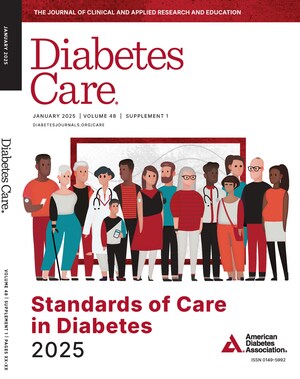WASHINGTON, June 27, 2021 /PRNewswire/ -- DARE-19 is the first large randomized clinical trial to assess sodium-glucose cotransporter-2 (SGLT2) inhibitors in patients with and without type 2 diabetes hospitalized with COVID-19. Additional findings from the trial were presented today at the virtual 81st Scientific Sessions of the American Diabetes Association® (ADA).
Patients with cardiometabolic risk factors, including type 2 diabetes, are at higher risk for developing serious COVID-19 related complications such as organ failure and death. In fact, Americans with diabetes and other related underlying health conditions are hospitalized six times more often and are 12 times more likely to die of COVID-19 than those without. Previous studies have shown SGLT2 inhibitors, a medication class initially used to help lower blood glucose, provide organ protection in patients with type 2 diabetes, heart failure, and chronic kidney disease.
DARE-19, an investigator-sponsored, international, randomized trial, compared SGLT2 inhibitor dapagliflozin to placebo in 1,250 patients hospitalized for COVID-19 who also had a history of hypertension, atherosclerotic cardiovascular disease, heart failure with either preserved or reduced ejection fraction, type 2 diabetes, or stage three to four chronic kidney disease with estimated glomerular filtration rate (eGFR) between 25 and 60. Patients were recruited across 95 centers in seven countries between April 2020 and January 2021. Approximately half of the patients had a history of type 2 diabetes. Patients received dapagliflozin or placebo for 30 days in addition to the standard of care for COVID-19 in the participating hospital.
Results of the trial indicated:
- Treatment with dapagliflozin did not achieve statistically significant reduction in organ failure or death, or significantly improve clinical recovery, as compared with placebo (the two primary endpoints).
- Numerically fewer patients treated with dapagliflozin experienced organ failure or death (11.2% versus 13.8% with placebo, respectively), although this difference was not statistically significant. The findings were consistent across components of this endpoint (respiratory, cardiovascular, kidney complications, or death from any cause). These results were also consistent in patients both with and without type 2 diabetes.
- Dapagliflozin was well tolerated, with numerically fewer serious adverse events than placebo, and these findings were also consistent in patients with and without type 2 diabetes.
- Only two non-severe events of DKA were reported (both in patients with Type 2 diabetes).
- Furthermore, laboratory parameters were stable during hospitalization in patients treated with dapagliflozin and placebo, regardless of diabetes status.
"Previously, there were some concerns with using SGLT2 inhibitors in COVID-19 patients due to the potential risk for acute kidney injury and diabetic ketoacidosis. However, our results show dapagliflozin is well tolerated, with no new safety concerns," said Mikhail Kosiborod, Cardiologist and Vice President for Research at Saint Luke's Health System, Professor of Medicine, University of Missouri-Kansas City and lead investigator of the study. "We believe that our findings do not support routine discontinuation of SGLT2 inhibitors in patients hospitalized with COVID-19 that have other indications for these agents (such as Type 2 diabetes, heart failure and CKD), as long as patients are monitored."
The authors state that future trials are needed to further evaluate possible effects of dapagliflozin on the risk of organ failure or death in patients hospitalized with COVID-19. They also note DARE-19, which was funded by AstraZeneca, has important implications for future research, as it raises a hypothesis that SGLT2 inhibitors may offer organ protection in other types of acute illness such as sepsis, which should be explored in future studies.
Research presentation details:
Dr. Kosiborod and study investigators presented the findings of the trial during the symposium listed below:
- Efficacy and Safety of Dapagliflozin Symposium—Efficacy and Safety of Dapagliflozin in Patients with and without Type 2 Diabetes Hospitalized with COVID-19—Results from the DARE-19 Global Randomized Controlled Trial (includes live video Q&A period)
- Date: Sunday, June 27, 2:15–3:45 p.m. ET (all sessions will be recorded and accessible for 90 days)
- Dr. Kosiborod will be providing an overview of the study findings and available for virtual media interviews on Sunday, June 27 from 4:00–5:00 p.m. ET
- If interested in speaking with Dr. Kosiborod, register here.
For more information or to request an interview with Dr. Kosiborod, please contact the ADA Scientific Sessions media team at [email protected].
About the ADA's Scientific Sessions
The ADA's 81st Scientific Sessions, the world's largest scientific meeting focused on diabetes research, prevention, and care, will be held virtually June 25–29. Leading physicians, scientists, and health care professionals from around the world will unveil cutting-edge research, treatment recommendations, and advances toward a cure for diabetes. Though the conference will be remote this year, attendees will receive exclusive access to nearly 2,000 original research presentations and take part in provocative and engaging exchanges with leading diabetes experts. Learn more and register at scientificsessions.diabetes.org and join the Scientific Sessions conversation on social media using #ADA2021.
About the American Diabetes Association
Every day, more than 4,000 people are newly diagnosed with diabetes in America. More than 122 million Americans have diabetes or prediabetes and are striving to manage their lives while living with the condition. The ADA is the nation's leading voluntary health organization fighting to bend the curve on the diabetes epidemic and help people living with diabetes thrive. For 80 years, the ADA has been driving discovery and research to treat, manage, and prevent diabetes while working relentlessly for a cure. We help people with diabetes thrive by fighting for their rights and developing programs, advocacy, and education designed to improve their quality of life. Diabetes has brought us together, what we do next will make us Connected for Life. To learn more or to get involved, visit us at diabetes.org or call 1-800-DIABETES (1-800-342-2383). Join the fight with us on Facebook (American Diabetes Association), Twitter (@AmDiabetesAssn), and Instagram (@AmDiabetesAssn).
Contact: Daisy Diaz, 703-253-4807
[email protected]
SOURCE American Diabetes Association

Related Links
WANT YOUR COMPANY'S NEWS FEATURED ON PRNEWSWIRE.COM?
Newsrooms &
Influencers
Digital Media
Outlets
Journalists
Opted In






Share this article